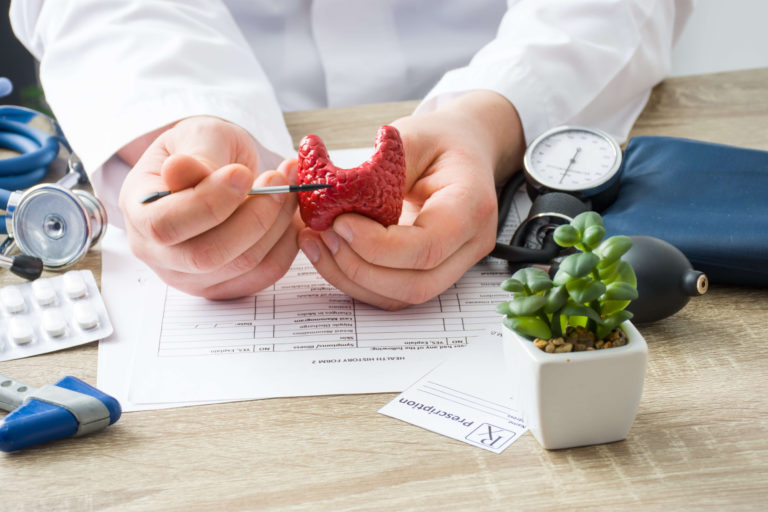Hypothyroidism and Hashimoto’s disease are two of the most common thyroid disorders that disproportionately affect women. They both impact the thyroid, and they share many of the symptoms. And both are grossly underdiagnosed!
Most women diagnosed with hypothyroidism are, in fact, suffering from Hashimoto’s. Although related to hypothyroidism, Hashimoto’s thyroiditis is an autoimmune condition and requires different treatment.
Hypothyroidism
Hypothyroidism, also known as underactive thyroid, is when the thyroid gland doesn’t produce enough thyroid hormones. The exact mechanisms that cause hypothyroidism are unknown, but potential causes include aging, genetics, excessive iodine, pregnancy, and radiation exposure.
Symptoms may vary, but often include:
- Fatigue
- Weight gain
- Constipation
- “Puffy” face
- Slowed heart rate
- Goiter (enlarged neck)
- Depression
- Decreased sweating
- Heavy or irregular periods
- Low blood pressure
- Thinning hair and eyebrows (outer third)
Hypothyroidism symptoms may present similar to other medical conditions, so the best way to diagnose hypothyroidism is to run a comprehensive thyroid panel. The conventional way to treat hypothyroidism is to use synthetic thyroid replacement (T4). However, some people are not good converters of T4 to T3 and may need supplementation with T3. Zinc and selenium are required for this conversion, so including these in the diet or supplementing is important if there are deficiencies.
Hashimoto’s Thyroiditis
Hashimoto’s thyroiditis, on the other hand, is an autoimmune disease where the immune system mistakenly attacks the thyroid gland. Over time, this autoimmune attack destroys thyroid tissue and reduces thyroid hormone production, which leads to hypothyroidism.
In autoimmune conditions like Hashimoto’s, antibodies can show up as early as 8 years before symptoms and diagnosis. By the time you have symptoms, you’ve had subtle shifts in function for nearly a decade. Many women with Hashimoto’s fluctuate between the symptoms of hyper and hypothyroidism until the thyroid ultimately burns itself out.
One of the first physical manifestations of the Hashimoto’s may be an enlarged thyroid, called a goiter. The condition causes the front of the neck to appear swollen. Other symptoms of Hashimoto’s include:
- Fatigue
- Weight gain
- “Puffy” face
- Muscle and joint pain
- Hair loss or brittle hair
- Slow heart rate
- Irregular or heavy periods
How To Know If You Have Hashimoto’s Disease
Considering the similarities, you can see why Hashimoto’s disease is often confused and used interchangeably with hypothyroidism. In reality, Hashimoto’s is one of the causes of hypothyroidism. When either of these conditions is suspected, practitioners will usually order a TSH test, thyroid-stimulating hormone.
Conventional doctors will typically use an elevated TSH level to diagnose hypothyroidism, but TSH alone doesn’t provide complete data. And to further cloud the picture, many labs are still using outdated “normal” ranges. Most people feel best when their TSH is between 1 and 2, but the “normal” range can go as high as 5.5!
Many women have been dismissed with a pat on the head and an “everything is normal.” Don’t settle for this. Know your numbers and insist on a full panel that includes free T3, free T4, TPO thyroglobulin antibodies, and reverse T3 along with TSH. High antibodies (TPO and thyroglobulin) are a clue that Hashimoto’s may be a problem. This is important to know because the management differs from garden-variety hypothyroidism.
Rooting Out The Cause of The Autoimmune Attack
Functional medicine is based on science and searching for the root cause of your symptoms. Many different factors can lead to Hashimoto’s, but here are a few of the strategies that can be used to identify the root cause of the autoimmune attack on the thyroid.
Food intolerance testing.
If a food causes inflammation, this triggers autoimmune attacks. Studies show a link between gluten intolerance and Hashimoto’s thyroiditis.
Gut health testing.
Poor gut health contributes to Hashimoto’s hypothyroidism. Tests screen for leaky gut, gut function, parasites, bacterial overgrowth, and autoimmune reactions. I use the GI Map test for this.
Blood chemistry test.
This is a great starting point in functional medicine testing for Hashimoto’s low thyroid. An important aspect of it is that functional medicine ranges can be very different than “normal” lab ranges. Blood tests can catch a pattern of disease while there’s time to reverse it.
Chemical and metal sensitivity testing.
As with foods, an immune reaction to chemicals or metals can trigger Hashimoto’s low thyroid flares.
Hormone and adrenal function testing.
Hormone imbalances affect thyroid health. Testing screens for excesses, deficiencies, feedback loops, and how well you metabolize hormones. Adrenal testing shows the link between health and how you handle stress. The DUTCH test assesses all of this.
DNA genetic testing.
Genetic testing helps give you insight into your disease risk and genetic variations that can affect health. An example is the MTHFR variant.
These are just a few examples of the types of testing used in functional medicine when working with Hashimoto’s hypothyroidism. What type of testing you need depends on your symptoms and health history.
Non-drug Management of Hashimoto’s
It’s important to keep in mind that the body usually goes into autoimmune activation for a reason. Often this is because of chronic immune system activation over a long period of time. It’s a response to something the body is carrying around on a daily basis. This could be due to infections, toxins, food sensitivities, chronic stress, or other inflammatory mediators.
Here are some first steps to help manage Hashimoto’s (or any autoimmune condition):
- Implement 100% elimination of dairy, gluten, and other grains. These are the most common foods involved in promoting enhanced intestinal permeability that sustains a hypervigilant immune response.
- Heal enhanced intestinal permeability which is usually present in autoimmune disease.
- Strengthen and balance immune function by ensuring optimal levels of Vitamin D, Vitamin A, and zinc. Stress relief and deep, consistent sleep may sound like overly simple, throwaway recommendations. However, they are actually foundational, essential requirements in progressive healing from chronic autoimmune dynamics.
- Probiotics are particularly important for all clients with an auto-immune disease as they help to calm the immune system, especially one that includes S. Boulardii, a beneficial yeast that helps to increase levels of T-regulatory cells. I like Orthobiotic for this.
- A high-quality methylated B complex, such as Thorne’s Basic B, will help to ensure circulation is not being inhibited by insufficient nutrient cofactors and will also help to mediate the effects of stress.
- Reduce exposure to chemicals in food, personal hygiene, and cleaning products, as well as, mold and heavy metals. Do an inventory of your home. Here’s a good resource for this: www.ewg.org.
If these first steps fail to control symptoms, then medication may be required. Treatment is similar to that of garden-variety hypothyroidism with synthetic T4 and/or T3.
If you see yourself in this article, get tested.
If your doctor won’t do it, order the test yourself. You can do that here: https://www.ultalabtests.com/drannagarrett/. Order Thyroid Profile 9. I’d be happy to review it with you in a consultation. You can schedule that at www.drannagarrett.com/lets-talk.
Dr. Anna Garrett is a menopause expert and Doctor of Pharmacy. She helps women who are struggling with symptoms of perimenopause and menopause find natural hormone balancing solutions so they can rock their mojo through midlife and beyond. Dr. Anna is the author of Perimenopause: The Savvy Sister’s Guide to Hormone Harmony. Order your copy at www.perimenopausebook.com.
Dr. Anna is available for 1-1 consultation. Find out more at www.drannagarrett.com/lets-tal




